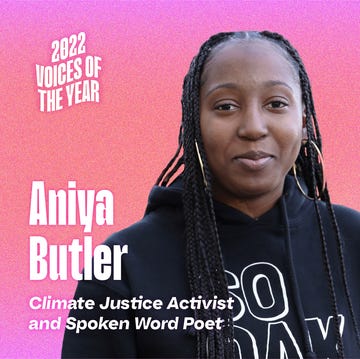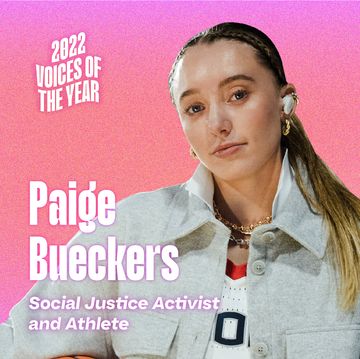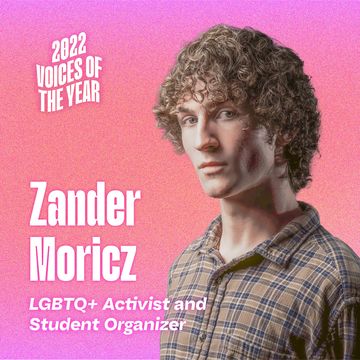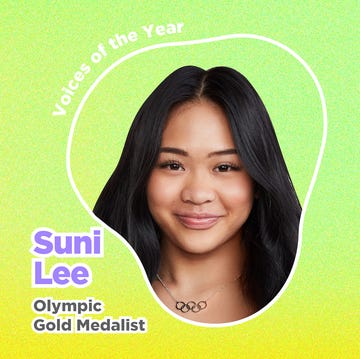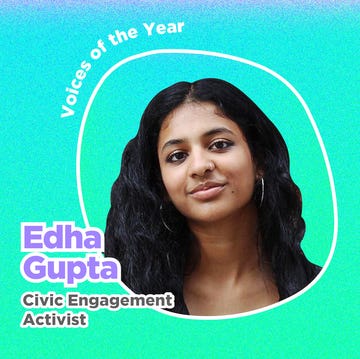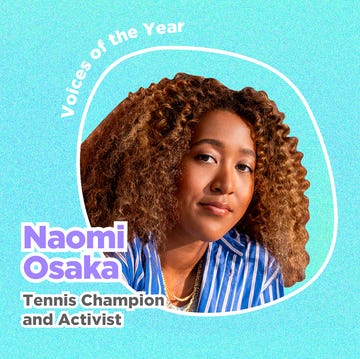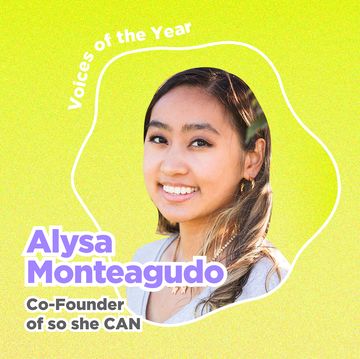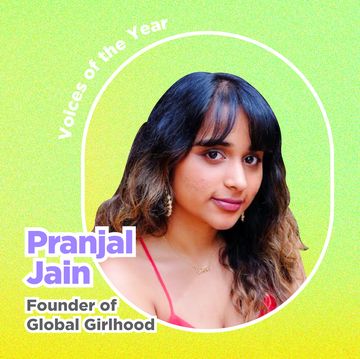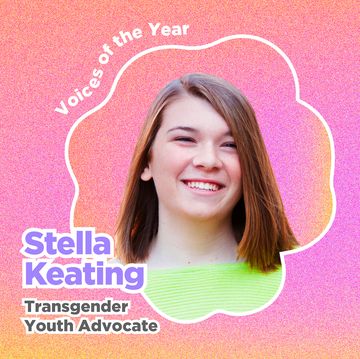Sex ed is one class that often leaves high school students with more questions than answers. For Tuscon, Arizona native Deja Foxx, it was the place where her passion for activism began. At only 15, Deja moved out of her mother's home and experienced hidden homelessness. Her immediate need for access to quality sexual and reproductive health education unveiled a new interest in advocacy that would shape the course of her young life.
By the time she was 16, Deja went viral on social media for standing up to former GOP Senator Jeff Flake over Trump-era legislation that would remove federal Title X funding from clinics, like Planned Parenthood, in many low-income neighborhoods. "The clips took off overnight, getting millions of views," she tells Seventeen. The overwhelming success of her confrontation led her to ask a few questions. "How can social media be used within our social justice spaces? How are young people leading that?" she wondered. With the help of local organizers from groups like Planned Parenthood, Deja mobilized for a more inclusive curriculum and saw her first victory. She co-founded the El Rio Reproductive Health Access Project, a grant-funded program that ensures all young people in Tucson have access to reproductive health care.
At only 22 years old, Deja is now a tenured activist, trusted social strategist, content creator, brand founder, and college student. She previously worked as the youngest staffer as the Influencer and Surrogate Specialist for the Kamala Harris campaign in 2020 and created content for Ford Models, all the while attending her dream school at Columbia University — and this is still only the beginning for her very bright future.
More From Seventeen
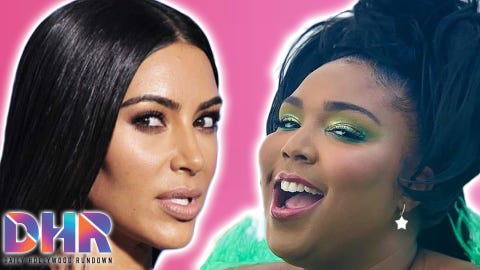
What inspired you to get involved in reproductive health and social justice?
Deja Foxx: I was sitting in my sex education class, which was taught by the baseball coach, and realized I wasn't getting quality sex education, and that I deserved a higher quality and I certainly wasn't going to get it at home. I found my leadership. I found my voice through that advocacy work and through partnerships with Planned Parenthood and local organizers in my neighborhood who helped train me and build [a] strategy around the change I wanted to see in my school district. Eventually, after six months of organizing alongside my peers, we won education reform.
What accomplishment are you most proud of achieving?
DF: The easy answer to this question would be to pick something that people have told me to be proud of, something that has been in a lot of headlines that is traditionally celebrated, like my education or a job title. At 22, I can sit here looking back on what has already been a pretty hefty career. The thing that I would like to be in this life is a good role model. That speaks to not what I do, but how I do it. I am proud to have centered that "how," to have made mistakes in public, and to show people that you don't have to be perfect to get started. That is what I'm most proud of. I'm most proud of how I've done what I've done — not what I've done.
How have you grown since first getting involved in activism?
DF: It was really scary. I remember on my 20th birthday feeling a sense of dread. I felt really scared to leave my teens behind and step into my 20-somethings. When I turned 20, one of the ways that I began to reclaim my agency over my own identity, over my own work, over my own story — because, to be clear, I started doing this when I was a kid — and so as I stepped into adulthood and stepped into agency, a lot of that looked like taking control of my visual identity.
I cut my hair — which at the time was down to my hips — to my shoulders on Instagram Live. I changed the way that I did my makeup. I changed the way that I dressed, the kind of respectability I was playing into the way that I dressed. I was more interested in self-expression instead of trying to fit into a box. I claimed ownership over my visual identity.
I'll also add that in my professional life — because I had been doing this work a long time — I gained real expertise and skills. One of the ways that I stepped into my 20-somethings was also owning the experience that I had already built and not downplaying it because of my age, but really leaning into it and saying, "I am one of the first people to come of age on the internet, to be native to these digital spaces, and to have this expertise," and really owning my usefulness as a power and a source of knowledge when so many people tried to tell you otherwise. I think that was really powerful for me to do.
What challenges did you learn from the most?
DF: There was a moment when I got offered the job on the Kamala Harris campaign. I was 19 years old. I was just starting my sophomore year at Columbia, and there were like 20 something people in the Democratic primary, so it wasn't clear who was going to win yet. Kamala Harris obviously wasn't vice president yet, so I was taking a shot in the dark. The risk was a lot higher than what we understand it to be in retrospect. I almost didn't take that job, the incredible opportunity that it was, because I was scared people weren't going to like me. I was scared to lose friends over it. I was scared of what people on the internet might say or think.
I can zoom out now and see how silly that seemed because it was such an amazing opportunity. Not only professionally and individually, but [it was] an amazing opportunity to advance what young people's roles should be in politics and where we should sit. I got to be one of the youngest campaign staffers in modern history. It was a wonderful opportunity to declare that, no, the internet is really having this gigantic impact. Content creators are influencing elections. It was a wonderful opportunity to make an intellectual stand, to stand in that moment of history and mobilize the knowledge I had as a digital native and young person, in what was arguably the most important election of my lifetime. And I almost didn't take it because I was scared people weren't going to like me.
That sounds so silly now, but when I was 19 and on campus, that was really real for me. The challenge was zooming out. As young people, it is something that we have to do when we're making decisions. We have to zoom out. It is all too easy to get caught up in the day-to-day, in what people think of us. Ultimately, only we have to really live with the decisions we make. Not your family, not your friends, not your professors. None of them are going to have to live with your choices the way you will. When we zoom out and see the story we are writing for ourselves, that we are writing for our future and our communities, we have to make the best decision with the information we have. One of the biggest challenges has been to make my own decisions and to make them wholeheartedly, to prioritize the knowledge that I have as true and right, and to move forward with that confidently.
What inspires you to keep advocating for others?
DF: When I woke up to the reversal of Roe v. Wade, my immediate feelings weren't shock or surprise. If you'd been doing this work, you knew it was coming. But I felt a deep sense of grief, and I still do. I grieve for all of the years that I've put into this. The years that I've given up a private life to do this work. I've made all of these concessions and put my energy, time, story, and safety in some moments, on the line, and we are further behind than when we started when I was 15. That is a really hard pill to swallow. It's even harder to sell to young people to keep them getting active.
We are bearing the brunt of decisions that were made by other people. Messes made by generations ahead of us. And that's not to say that everyone ahead of us is to blame. To be quite honest, there are people that have been doing this work for decades who are probably a lot more sick and tired and grief-stricken than me, but it is certainly not young Gen Z's fault that the Supreme Court looks the way it does, or that Roe v. Wade was overturned. Many of us were too young to vote for the people who appointed those Supreme Court justices, but we will undoubtedly have to bear the brunt of it.
There is no easy out, and as I look forward to the future — feeling disenchanted as I do with the people who are making decisions, who are holding lifetime appointments in the Supreme Court — I know that I'm turning my focus toward the things that cannot be taken away from us. That is the community infrastructure that we build. That is investing in each other. Something that I've always said, and that has been set on me by other organizers, is that when you do this work, you will take losses. It is inevitable. But when I invest in someone's leadership potential, when they invest in my storytelling skills, when I empower them with an opportunity that makes them a stronger advocate, when we invest in each other, we never lose. That's how we create sustainable movements. It's not by focusing on this election and pouring resources in just for that quick sprint, and then when it's over, we've lost all of those resources for nothing. No. If we continue to pour into one another each time, we will be at a better place than when we started. That's how we're going to create a sustainable movement for this long way forward.
Parts of this interview have been edited and condensed for clarity.
Photo Credit: Emily Lord. Design by Yoora Kim.

Jasmine Washington is an Assistant Editor at Seventeen, where she covers celebrity news, beauty, lifestyle, and more. For the past decade, she has worked for media outlets, including BET, MadameNoire, VH1, and many others, where she used her voice to tell stories across various verticals. Follow her on Instagram.


